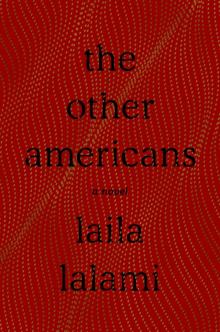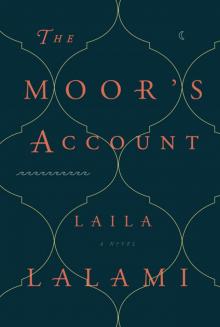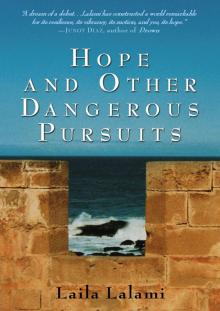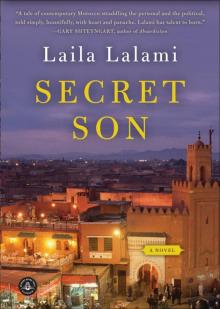- Home
- Laila Lalami
The Other Americans Page 3
The Other Americans Read online
Page 3
One day the jazz band was invited to perform at the Summer Festival in Palm Springs. Walking across the stage to the piano, I did what my teacher had advised. Pretend you’re only playing for one person. That way you won’t be so nervous. I glanced at my father, who sat in the front row, leaning his head just so, waiting. Then I closed my eyes, and began to play. As my fingers moved on the keys, I felt as if I were speaking to my bandmates, calling to Manuel on the drums or answering a question from Lily on the bass. The talk between us deepened, and I became so immersed in our many-colored conversation that when it was over I was nearly startled by the rousing applause from the audience. I remember feeling happy that night, and whole.
Yet the sense of being different never completely went away. The fault lines usually appeared when I was asked what church I went to, or when my mother spoke to me in the school parking lot, or when the history teacher asked a random question about the Middle East and all eyes turned to me for an answer. It didn’t help that my parents weren’t getting along and that there was constant squabbling at home. Every time a door was slammed or a dish was smashed, I locked myself in my room and listened to music. I dreamed of growing up, going to college, escaping the desert. “Why do you always have your head in the clouds?” my mother would ask.
All at once I felt alert to the smell of the coffee brewing in the pot, the starch of the napkin in my hand, the weight of my body against the kitchen counter. “I don’t have my head in the clouds,” I said. “I just think that today isn’t a good day to be talking about money.”
“We’re not talking about money,” Salma said. “We’re talking about Baba’s restaurant, which he cared about immensely, as you yourself pointed out a little while ago.”
“That’s not what I meant.”
“Well, what did you mean, then?”
“It would be good if your husband was a bit more sensitive, that’s all.”
“He was only trying to help.”
The doorbell rang, startling me. Salma went to answer it, her bracelets jingling on her wrist at a steady pace, as though she were keeping time. With a growing ache in my chest, I finished folding the napkins. Only a day in this house and already the arguments had started. I didn’t understand why people were visiting the house so soon; it could have waited until after the funeral. I didn’t want to hear the story, told again and again to each new visitor, of how my father had been found unconscious on the pavement by a schoolteacher out on her nightly run. The paramedics arrived only minutes later, but it was too late, he was already dead. I didn’t want to be asked where I was when it happened, or how I heard the news. I grew tired of shaking hands with my sister’s friends, tired of hearing their hushed voices. After a while, I retreated to the deck.
Jeremy
When I got to her house, the front door was open. I could hear the din of overlapping conversations inside, some of them in a language that felt familiar to me but that I couldn’t understand. There were several pairs of shoes lined up at the entrance, and I wondered if I should take mine off as well, but what if she wasn’t even here? Framed photographs hung along the hallway, including one from our high school jazz band. It occurred to me that I had never been inside her house before, and yet for ten years my likeness had waited for me on the wall.
In the living room, I found myself in a crowd of strangers, all of them standing in small clusters, drinking tea from tiny blue glasses. Her mother sat on the sofa, absorbed in a conversation with an old man in a black jacket and a white skullcap. The phone rang in the kitchen. Someone called out for a glass of water and an Advil. The house was loud and stuffy and I felt out of place. I had come straight from the police station, and now I wasn’t so sure it was a good idea. Then I saw her on the deck.
I walked through the glass doors, relieved to be out of the crowd if nothing else. It was just after dusk, the sky turning from blue to black. Along the wooden fence, bundles of red Indian paintbrush glowed like the embers of a dying fire. The floorboards creaked under my shoes. “Nora,” I called. At the sound of my voice, she turned around. Her hair was long and black and fell about her shoulders. Her eyes were as I remembered them, dark and direct. She was wearing a green dress cinched at the waist with a narrow belt. In the yellow light that came from the living room, her skin looked golden. “I’m sorry for your loss.”
She looked at me wordlessly, and for a moment I had the horrifying thought that she didn’t remember me and that I shouldn’t have come at all. But then she crossed the deck, her bare feet light and silent on the wooden slats, and hugged me. Warmly, I thought later that night as I sat in a bath. “Thank you for coming, Jeremy,” she said. When she stepped back, her gaze was drawn to the living room. A sudden wail soared, and a chorus of bereaved voices rose in comfort. She looked at me again, this time with despair. “Would you mind—could you stay for a bit?”
“Sure, of course.” I sat beside her on the wooden bench. But for all my certainty about coming to see her, I had prepared nothing else to say. I settled on something simple. “Your father was a good man.”
“Thank you for saying that,” she said, and touched my arm lightly.
“I remember when we had afternoon rehearsals, he’d come and listen to us. To you. None of the other parents did that.”
She crossed her legs—they were long and brown, and her toenails were painted red. I forced myself to look away, patted my pocket, tried to remember how many cigarettes I’d had that day. Fewer than five. My new one-day limit. “Do you mind if I smoke?”
“No, go ahead.”
I lit a cigarette and blew the smoke away from her, but the wind was against me. For a week now, fierce Santa Anas had been sweeping across the valley, bringing with them heat, dust, and the calls of wild animals from the mountains. Between gusts of wind, a low murmur drifted out from the living room.
“How did you hear about my dad?”
“One of my colleagues is working the case.”
“You’re a detective?”
“Sheriff’s deputy. You sound surprised.”
“I thought maybe you would end up a teacher or something. You always turned in the best paper in AP English.”
But that was my only AP class. The truth was, I hadn’t been a great student in high school. Always distracted, the teachers said. It wasn’t distraction, though, it was exhaustion. I worked after school, took care of my sister, and stayed up most nights until my father came home. Nothing the teachers talked about in class seemed all that important by comparison. In AP English, at least, we got to read novels, and I’d always loved reading. I took a drag from my cigarette and tried to picture myself the way Nora had, in a classroom with kids, but the image seemed incongruous to me. The path my life had taken was the only one I could imagine for myself now. “I guess we don’t always end up where we expect,” I said. “What about you?”
“I’m a musician. A composer.”
“See now, that makes sense.” What could be more natural than Nora at the piano? She was always a minute or two early to music class, a minute or two late in leaving. Played every tune perfectly the first time around, then had to wait for the rest of us to catch up. “Is there someplace I can hear your music?”
“Not really.” She hesitated. “I mean, I’ve recorded a few pieces you can find online, but I don’t have orchestra commissions or a record deal or anything like that. I work as a substitute teacher to pay the bills. So.”
Without knowing why, I felt I had to stave off the disappointment I heard in her voice. “I’m sure you’ll get one soon.”
“That makes one of us,” she said with a chuckle.
We were quiet for a long moment, though the silence was not uncomfortable. Sitting together in the dark, we could see everything inside the house. It made the moment feel intimate, as if we were sharing something secret, or even illicit. In the kitchen, her sister put a fresh kettle on the stove
, then said something to two women standing at the counter. An elderly couple walked into the living room, carrying Pyrex dishes covered with aluminum foil. The phone rang three times before someone went to answer it. “Are you waiting for those people to leave?” I asked.
“It’s been such a horrible day, I can’t bear talking to anyone.”
“Who are they?”
“The man sitting next to my mom is my uncle. He brought a friend of his from the mosque out in Los Angeles, to help her arrange the funeral. The couple drinking coffee in the kitchen are our neighbors. And the others are friends of my sister’s, for the most part.”
In the piñon pine, an owl hooted. Nora brought her knees to her chest and gathered her arms around them. “I can’t cry,” she said.
“I didn’t either after my mom died. Not for a while, anyway.” I stubbed out my cigarette.
“Can I bum one off you? You’re tempting me.”
When I flicked the lighter for her, I noticed a tattooed inscription on the inside of her wrist, but I couldn’t make out the words. It was too dark and her hands were shaking. “This is probably no consolation,” I said, “but Coleman—the detective who’s working the case—she’s really good. She’ll find the bastard who did this.”
“She hasn’t told us anything. My dad gets run over half a block from the restaurant and she can’t rustle up any leads. Nothing.”
“She will. It’s just going to take a little time.”
“I knew this would happen.”
“How do you mean?”
“I knew something terrible would happen. You remember his business was arsoned after September 11th? They never found out who did it. And then he put up a huge flag outside his restaurant, like he had to prove he was one of the good ones. I told him over and over that he should sell. But he refused, he loved it here. God only knows why.”
It seemed to me that she was talking to herself, arguing with the past as though she could alter it. As though the past could ever be altered. That was how I had felt, too, when my mother died. Late one afternoon, I came home from baseball practice, still basking in the coach’s praise of my swing, still aroused by the sight of Maddie Clarke in a miniskirt cheering me from the stands, still smiling at the teasing jokes of my teammates, to find my mother passed out in the hallway, her purse slung across her chest, the day’s mail in her hand. I scrambled for the phone, all the while struggling to remember the first-aid class I’d taken two years earlier, in the seventh grade. Was I supposed to look for a pulse? Move her or leave her on her side like that? Carefully, I turned her on her back, tapped her cheeks, unbuttoned her collar. Somehow I managed to find a pulse, but I couldn’t wake her and neither could the paramedics when they arrived. By the time my father and sister had caught up with me at the Hi-Desert Medical Center, she was dead. Pulmonary embolism. To this day I can still remember, with a clarity that startles me, my father standing in a colorless hospital hallway, telling the doctor that there must be some mistake, that all she had was a little cough.
But there was no mistake; she was gone. She wasn’t there when I returned to our dark and empty house later that night. She didn’t call my name from her bedroom, didn’t ask, What are you still doing up? You’d better go to sleep, it’s a school night. In the morning, she wasn’t leaning against the kitchen counter, sipping from her cup of coffee, looking out of the window at the new day. She didn’t say, Did you forget to take the trash out last night? Because I smell something. She didn’t ruffle my hair and ask if I slept well. I didn’t sleep at all, either that night or many, many others to come. Her absence was too heavy to be surrendered to dreams.
For the funeral, my aunts Aura and Estella drove down from El Monte and my uncle Paul flew in from Oregon. They bought me a black suit and helped me with my tie and told me stories I hadn’t heard before, stories about how my mother had won second place in a dance contest at the Orange County fair; how she had hives when she sat for her teaching-credential exam; how she could play any tune on the violin by ear, any tune at all, no matter how difficult; how she’d traveled all the way to Sonora three weeks after giving birth to Ashley, just to help out a cousin who’d gotten into trouble. These stories were meant to be comforting, but in truth they were excruciating. I wished all the family would leave. Then they left, the house was empty again, and I wished they had stayed. At school, nothing made sense. My bandmates gave me a condolence card they had all signed, but I had missed the spring recital, and I felt left out of the conversations they had about it. Some of the boys on the baseball team came up to me to say they were sorry for my loss, but at lunch they all stayed away, as if my grief were contagious. And when I came home, my father was sitting in the dark, drinking and staring into space. The silence was so profound, so unrelenting, that Ashley went to eat dinner with the Johnsons, a rowdy family that lived two doors down from us.
“Dad, should we just have cereal for dinner?” I asked.
“Whatever you think,” my father said.
To fill the silence in the living room while I did my homework, I turned on the television. The sound was oddly comforting, even though it made it more difficult for me to concentrate. I kept reading and rereading the same three or four lines in my textbook as my mind wandered to distant days when my mother was alive and healthy. She would never again watch me play ball with the team I’d worked so hard to join, never again expertly correct my intonation on the guitar, never again pretend to be amused by one of my stupid jokes. I hadn’t realized how close we were until she died.
Then Ashley began to follow the Johnsons to their church, where they ran a popular Bible study on Tuesdays and Thursdays. She would return home on those nights with a satiated look on her face that I was sure couldn’t have been solely the result of the meal that was served beforehand. Although both of my parents had been regular churchgoers, they didn’t force Scripture into every conversation, or leaflet the neighborhood, or roll their eyes at evolution the way the Johnsons did. But now my father didn’t even bother leaving the house on Sunday.
“Dad, should I make mac and cheese?” I asked.
“Whatever you think,” my father said.
I started to come home early so I could make dinner. I missed practice too many times and by the start of my sophomore year I was dropped from the baseball team. In September, when al-Qaeda flew planes into the World Trade Center in New York, my father sat up in the easy chair and for the first time started to pay attention to the television. From then on Fox News was on at such high volumes that I retreated to my bedroom, ostensibly to do my homework, though most of the time I just read a book or played my guitar. My grades dropped.
But my cooking improved. Almost every night, I had a main dish and a side on the dinner table by seven. My father ate whatever I put in front of him, but Ashley was always rushing to get to the Johnsons’. She never finished her plate, so I finished it for her. I gained a lot of weight, and a lot of it in the wrong places. When I walked down the hallways at school, it seemed to me that everyone was staring at the man boobs growing under my shirt. Now if I tried to say hello to Maddie Clarke, she replied with a disgusted grunt. Only months before I had been a head taller than the other boys, but now I was visible in a way that, strangely, made me feel invisible. My days became a blur of mechanical motions: get up, go to school, go home, make dinner, go to sleep, start over.
Before my mother’s death, my plan had been to go to university to study speech pathology. As a child, I’d suffered from an articulation disorder that had required several months of therapy, and I still remembered how empowering it had felt to overcome it. And, having grown up with a mother who taught second-language learners, I thought that a career helping kids would be a good fit for me. But in December of my senior year, when I received an acceptance letter from the state school, my enthusiasm had dimmed and I wasn’t so sure speech pathology was right for me anymore.
&nbs
p; “Dad, what do you think I should do?” I asked.
“Whatever you think,” my father said.
It was hard for me to escape the feeling that I had become my own parent. I did the grocery shopping, the cooking, and the laundry. When Ashley got her period, I was the one who went to the store with her to buy tampons. Because my father was now frequently short on cash, I found a part-time job at the ice-cream parlor, but there was never enough money to go around, and each month I had to figure out which bill to pay and which to skip. But just this once, I wanted my father to guide me, talk to me, help me sort out my future. And if he couldn’t do that, then the least he could do would be to show up. Just show up. For each public performance of the Yucca Valley High School jazz band, I would leave a flyer on the refrigerator, with the date and place circled in highlighter. When I walked onto the stage with my guitar, I would scan the back of the auditorium, hoping to catch a glimpse of my father. But he never came, unlike Nora’s. Even at this moment, I could recall the intense envy I felt whenever I saw Mr. Guerraoui in the front row. His eyes were full of pride, something I never experienced with my dad.
I glanced at Nora. The tip of her cigarette had grown heavy with ash.
“Careful,” I said. “You’ll get burned.”
She looked at her cigarette as if she didn’t know how it got there. In that slight movement of her arm, the ash scattered over the back of her hand. She brushed it off, then looked once more toward the living room. The crowd had finally thinned; only a handful of people remained. She stood up. “Thank you again for coming, Jeremy.” She walked me back through the house to the front door.
This time, when I passed by the picture on the hallway wall, I didn’t stop.

 The Other Americans
The Other Americans The Moor's Account
The Moor's Account Hope & Other Dangerous Pursuits
Hope & Other Dangerous Pursuits Secret Son
Secret Son